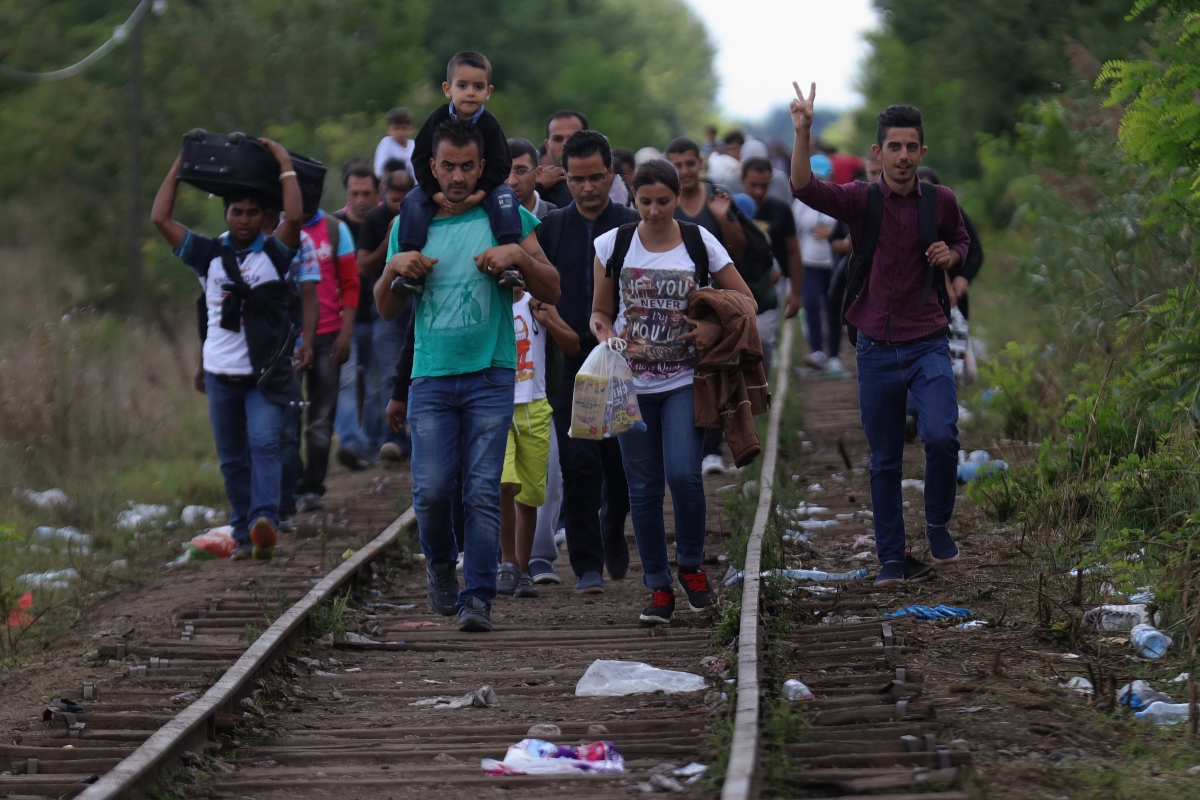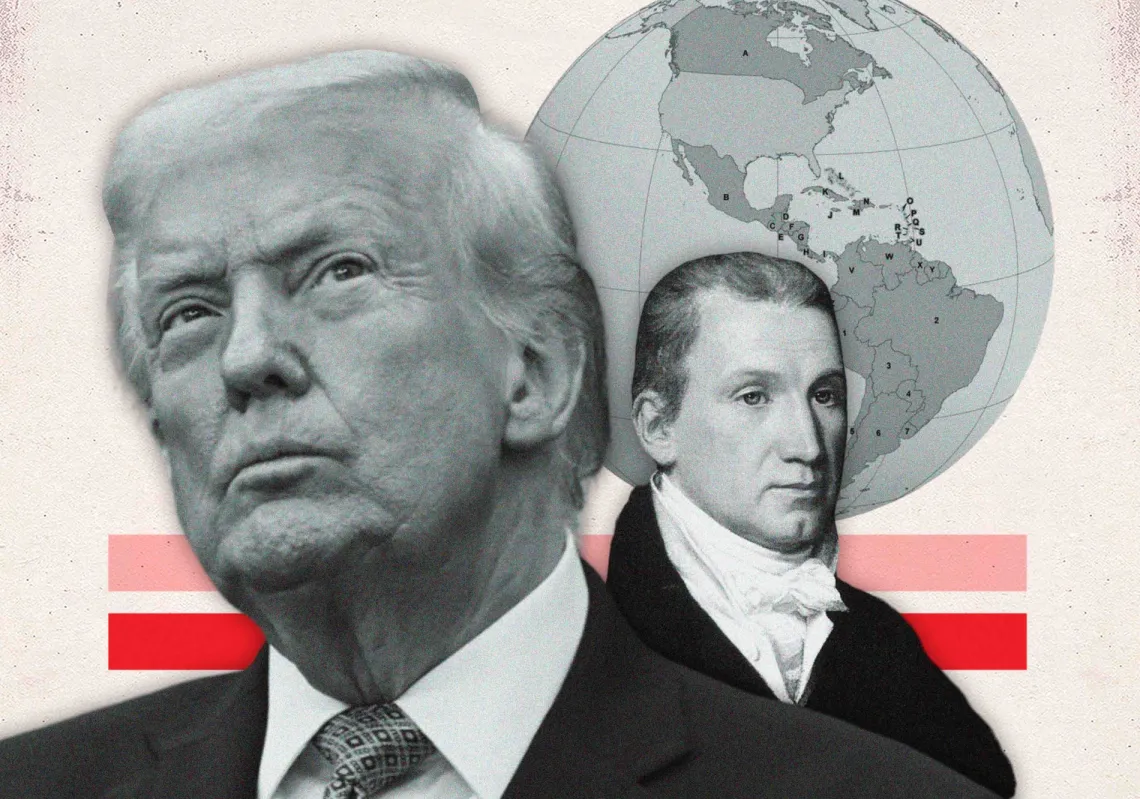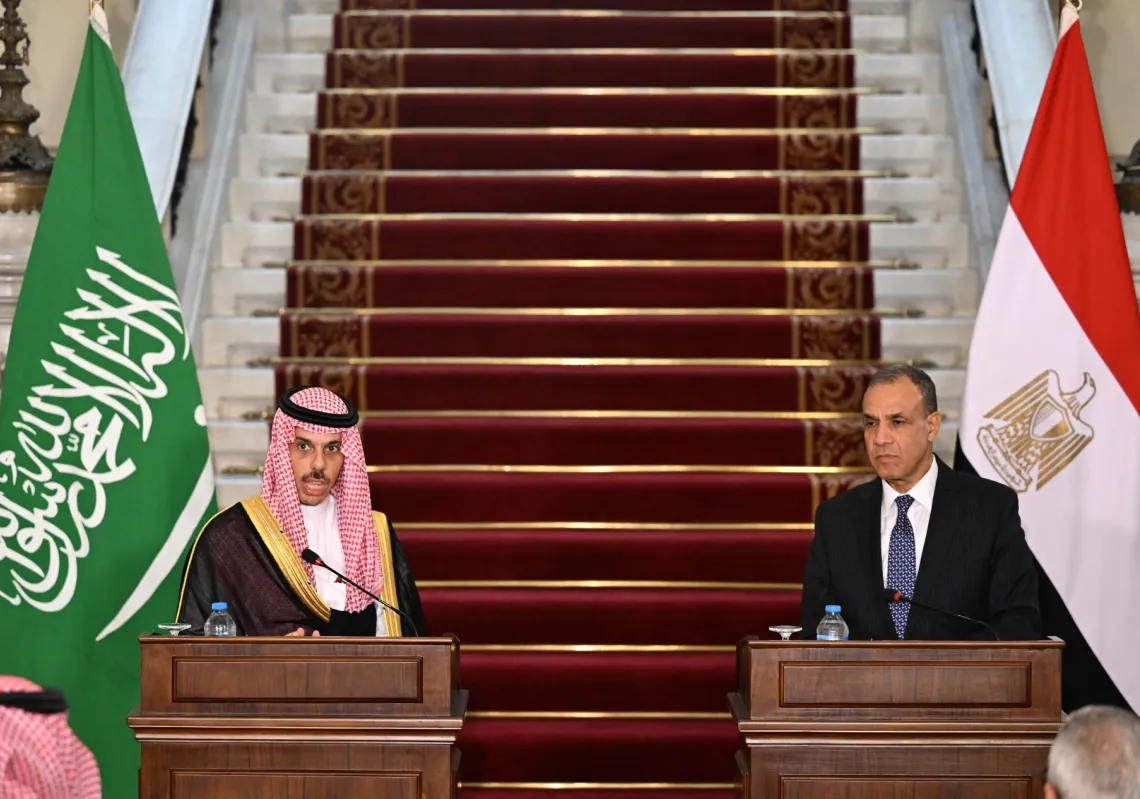 Migrants and refugees celebrate as they cross the border from Serbia into Hungary along the railway tracks close to the village of Roszke on September 6, 2015 in Szeged, Hungary. (Getty Images)[/caption]
Migrants and refugees celebrate as they cross the border from Serbia into Hungary along the railway tracks close to the village of Roszke on September 6, 2015 in Szeged, Hungary. (Getty Images)[/caption]
by Andras Biro-Nagy
On Sunday, Hungarian Prime Minister Viktor Orban was reelected to a third consecutive term after his right-wing Fidesz party won 48 percent of the vote, enough for a two-thirds supermajority in parliament. It was a decisive win for Orban, who in recent years has clashed publicly with the European Union, becoming for many a symbol of the illiberal nationalism now rising throughout the West.
Orban’s victory is a product of several factors, but three stand out: the systematic weakening of Hungary’s democratic system, the success of Orban’s antimigration platform, and the fragmentation of the opposition.
BACKSLIDING AWAY
The first ingredient in Fidesz’s electoral dominance is its rewriting of the rules of Hungarian democracy. The party began its current string of victories in 2010, when Hungarians’ disillusionment with the Socialist government—and more generally with the effects of the postcommunist transition and the 2008–9 financial crisis—allowed Fidesz to capture a constitutional supermajority, which it used to adopt a new constitution, change the country’s electoral laws, and assert government control over independent media, as well as making other, less conspicuous changes.
In Hungary, the electorate’s economic anxieties and general discontent with the political system, both before and after the 2010 election, have allowed Fidesz to implement these radical changes without provoking effective public opposition. Hungary should thus serve as an important lesson for other European countries: growing inequality and social tension may undermine the foundations of democracy and spark a revolt against the elite, enabling the rise of antiestablishment (and, in the Hungarian case, antidemocratic) forces that promise to do away with the status quo.
Since his party’s victory in 2014, moreover, Orban has become even more radical. That year, he openly professed his desire to build an “illiberal state” and became more authoritarian in terms of both policy and rhetoric. In 2017, he escalated his war on nongovernmental organizations with a bill targeting foreign-funded NGOs and adopted another controversial law that made it difficult for Hungary’s best university, the Central European University, to operate in the country. And in a major speech during the 2018 campaign, he promised to hold his opponents “morally, politically, and legally accountable” after the elections—a threat that should be taken seriously given the experience of the past few years.
Hungary should serve as an important lesson for other European countries: growing inequality and social tension may undermine the foundations of democracy.
Such policies and rhetoric have begun to undermine Hungary’s democracy. Four years ago, the Organization for Security and Cooperation in Europe concluded that the country’s elections were free but not fair—voters could vote for whomever they chose, but the playing field was tilted in favor of the government. The same assessment applies to Sunday’s elections. Voters were offered a diverse choice of parties and candidates, but a number of factors gave the ruling party unfair advantages. As in 2014, the recent election was characterized by campaign regulations that clearly favored Fidesz, biased media coverage, and a blurring of the line between the ruling political party and the state. Under these conditions, a surprise opposition victory would have meant that it is still possible to overcome the hurdles Fidesz has put in place. For now, it seems that it is not.
MIGRATION MATTERS
Another clear lesson of Hungary’s election is that migration was a winning issue for Orban. Indeed, Orban was so convinced that his tough stance would be enough to win that Fidesz campaigned exclusively on its opposition to immigration—the party did not draw up an election platform, made no economic or social promises, and did not participate in any debates.
Since the European migrant crisis began in late 2015, migration has trumped all other issues in Hungary—in this respect, Orban’s 2015 decision to close his country’s border and his continued defiance of EU requests to accept refugees have both been politically popular. Migration has proven to be an especially effective tool in mobilizing less educated voters, primarily in rural areas and in cities other than Budapest. Orban has successfully persuaded his base that only he and his government can protect the country against the “Muslim invasion” and the pernicious influence of outsiders, including Brussels, the Hungarian-born U.S. billionaire George Soros, Western liberals, and, most recently, the United Nations.
Although surveys suggest that Hungarians are aware of some of the downsides of Orban’s rule—an Ipsos MORI poll shows that 72 percent of Hungarians are displeased with the country’s health care system, and according to Transparency International’s Corruption Perceptions Index, Hungary ranks second to last in the EU in terms of corruption—for many the fear of migrants overrides other concerns. Since 2015, Orban has accordingly placed migration at the top of his agenda, skillfully exploiting his party’s vast media empire in the process. (This empire includes all of the country’s public media, which essentially operate as an extension of the ruling party’s communications division.) Orban has spent millions of euros in public money on spreading his propaganda using so-called national consultations—effectively expensive, taxpayer-funded push polls, in which survey questionnaires with manipulative questions were mailed to each household in Hungary, accompanied by public information (in reality, propaganda) campaigns in the mass media.
Orban’s 2015 decision to close his country’s border and his continued defiance of EU requests to accept refugees have both been politically popular.
The experience of the last few years shows that these national consultations have had a big impact on public discourse and attitudes. One clear effect is that 48 percent of Hungary’s voters on Sunday apparently feared immigration more than they cared about corruption scandals and the other problems in their everyday lives. And since businessmen close to the prime minister have acquired large parts of the Hungarian media, Fidesz has practically monopolized the flow of information to the uncommitted and uninformed. Today, opposition voices have very little ability to reach those rural voters who do not use the Internet. This also contributes to Hungary’s increasing urban-rural divide and thus to the enormous success of the government’s antimigration propaganda in the countryside.
[caption id="attachment_55256172" align="alignnone" width="940"]
 Hungarian Prime Minister Viktor Orban attends his Fidesz party campaign closing rally on April 6, 2018 in Szekesfehervar, Hungary. Hungary will hold a parliamentary election on April 8, 2018. (Getty Images)[/caption]
Hungarian Prime Minister Viktor Orban attends his Fidesz party campaign closing rally on April 6, 2018 in Szekesfehervar, Hungary. Hungary will hold a parliamentary election on April 8, 2018. (Getty Images)[/caption]
A FRACTURED OPPOSITION
The third major factor behind Orban’s victory is his own success in uniting the right at a time when the opposition is weak and divided. Orban has held his camp together for more than 15 years, using both economic and cultural nationalism to cement support from the more than two million voters who constitute the Fidesz base. In 2009, Orban laid out a vision in which Fidesz could remain in power for 15 to 20 years if it was able to establish itself as the “central political force,” with the opposition divided into left-wing and far-right blocs. After the collapse of the Socialist Party and the rise of the far-right Jobbik during the 2006–10 term of parliament, Orban’s prophecy came true, and Fidesz became the only major party in the Hungarian political landscape.
Not only is the country’s opposition divided between the left and the far right, but the left itself is highly fragmented, meaning there is no single center-left party comparable to Fidesz’s position on the center-right. Hungary’s left-wing and liberal opposition parties learned nothing from their 2014 fiasco, in which their failure to coordinate allowed Fidesz to win another supermajority, and this year they cooperated even less than at the last elections. For most of the 2018 campaign—and despite huge pressure from the majority of Hungarian citizens who wanted change—left-wing and liberal parties competed with each other over who would dominate the left in the future, rather than working together to replace Fidesz.
Since businessmen close to Orban have acquired large parts of the Hungarian media, Fidesz has practically monopolized the flow of information to the uncommitted and uninformed.
A clear indication of this division was the lack of an overarching electoral list that included all left-wing and liberal parties. These parties should have focused all their energies on offering a joint alternative to Orban’s illiberal regime; instead, there was an intense competition between the Socialists, the left-liberal Democratic Coalition, and the Greens for the leading position on the left. These parties joined forces only in a small minority of the country’s single-member constituencies, meaning that in many districts where a united opposition had a chance to win, the opposition vote was split among multiple candidates. Although Fidesz’s majority was never in doubt, the party’s ability to win another supermajority did indeed hinge on the left’s lack of electoral coordination. Fidesz was therefore able to win two-thirds of the seats in parliament despite receiving less than 50 percent of the vote.
WHAT'S NEXT?
The key question now is how Orban will react to his third consecutive victory. Nothing in the past eight years suggests that reconciliation will be on the agenda. The weakness of the opposition is likely to keep Fidesz focused on its other enemies—to wit: Brussels, Soros, NGOs, the Central European University, and independent media. The government may also take steps toward further centralization by reducing the power of local governments. The judiciary, which has so far largely managed to preserve its autonomy (the packed Constitutional Court is one vital exception), is also likely to be a target.
These are huge concerns for all Hungarians who disagree with Orban’s politics. From an international perspective, however, the most important strategic issues are how far Orban will go in his criticism of the EU and obstruction of common European policies and how much interference he will be willing to brook from Brussels, which has stepped up its criticism of his government in recent years. On the European side, the question is to what extent the continent’s leaders—especially those in Fidesz’s EU-level parliamentary party, the center-right European People’s Party—will tolerate the Hungarian government’s increasingly authoritarian policies. If the EU’s powerful center-right alliance keeps on providing political cover for the autocratic rule of Orban, Hungary’s democratic backsliding, dissemination of misinformation about Brussels, and misuse of EU funds will surely continue.
This article was originally published on ForeignAffairs.com.









